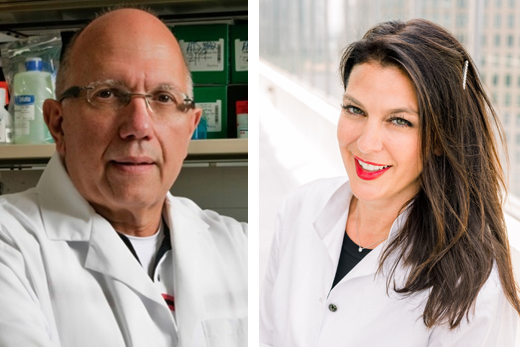The Georgia Research Alliance (GRA) has named two Emory faculty members as GRA-supported investigators. HIV and cancer immunologist Rafick-Pierre Sekaly, PhD, will be a GRA Eminent Scholar. Lung disease researcher Louise Hecker, PhD is being named a GRA Distinguished Investigator.
“We are pleased to welcome Dr. Sekaly and Dr. Hecker to Emory and the Georgia Research Alliance,” said Susan Shows, President of the Georgia Research Alliance. “They are both strong additions to Georgia’s team of university scientists who are working to bring positive outcomes in the fight against AIDS, COVID-19, and lung illnesses.”
The recruitments bolster Emory’s concentration of expertise in two critical areas of biomedical research, says Emory’s President Gregory Fenves. These are: immunology and infectious diseases, in Sekaly’s case, and reactive oxygen species, aging and fibrosis for Hecker.
“Dr. Sekaly is an international authority on HIV/AIDS,” Fenves says. “His joining Emory will accelerate ongoing collaborations aimed at a cure for HIV infection -- and our response to COVID-19.”
“Dr. Hecker is an extraordinarily productive scientist whose research focus is on pulmonary fibrosis and aging,” he says. “She has established a strong record of both high-impact science and entrepreneurship, and we look forward to her contributions to our translational research community.”
At Emory, Sekaly will be Vice-Chair of Translational Medicine in the Department of Pathology and Laboratory Medicine, and a member of the Winship Cancer Institute. He comes to Emory from Case Western Reserve University, where he was Richard J. Fasenmyer Professor of Immunopathogenesis, co-director of the Center of Systems Immunology, and co-leader of Case Western’s COVID-19 task force.
Sekaly is one of the world’s leading researchers focused on a cure for HIV/AIDS, and has led fundamental work on the persistence of the HIV reservoir and progression of HIV infection. For clinical trials, he has partnered with companies using gene therapy to make immune cells resistant to HIV. Sekaly’s lab has also pioneered the use of comprehensive systems approaches to study immune memory and immune responses to vaccines.
From 2009 to 2014, Sekaly was scientific director of the Vaccine and Gene Therapy Institute in Florida, and was previously based at the University of Montreal and McGill. Sekaly earned his PhD from the University of Lausanne in Switzerland in 1984.
Hecker is joining Emory University School of Medicine as an associate professor in the Division of Pulmonary, Allergy, Critical Care & Sleep Medicine. She also holds a joint appointment at the Atlanta Department of Veterans Affairs. Her research background and training are rooted in regenerative biology and tissue injury-repair responses.
Her research program focuses on understanding why repair responses go awry in aging and developing novel treatment strategies that could delay the onset of and/or reverse age-associated disease. Her ultimate goal is to unlock the secrets of aging in order to develop improved therapies that would help the elderly population live longer, healthier and happier lives.
Hecker comes to Emory from the University of Arizona, where she was associate professor of medicine in the division of pulmonary and critical care medicine. From 2009 to 2014, she was at the University of Alabama-Birmingham. She earned her PhD in applied physics at the University of Michigan in 2008. Hecker is the founder of two companies, a contract research organization (Regenerative Solutions) and pharmaceutical startup (Fibronox).
In 2019, the University of Arizona’s technology transfer agency named her “Inventor of the Year” and the Governor of Arizona named her “Innovator of the year” for her work through her company, Fibronox, which is developing small-molecule inhibitors targeting Nox4 as treatments for fibrotic disorders. Her research interests also include ARDS (acute respiratory distress syndrome) and Duchenne muscular dystrophy.
Established in 1990, the Georgia Research Alliance is a public-private partnership that supports the recruitment of top scientists to Georgia universities, fueling both new discoveries and economic growth. Currently 13 GRA Eminent Scholars and 3 Distinguished Investigators are at Emory.

